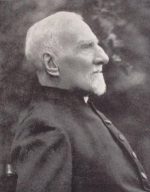Reverend Frederick Willett & the Anchor Inn
In 1881 the Reverend Willett retired from his parish in West Bromwich due to ill health and returned to his native Sussex to live in the Scaynes Hill property, which he had inherited, known as Bedales. At that time he also became the voluntary priest in charge at Saint Augustine’s Church, a post he held until 1905. It was his money that paid for the construction of the chancel, the side aisle and the church tower. His eldest son became the first Vicar’s Churchwarden after St Augustine’s became a parish in 1930, and several of the monuments in the church are dedicated to, or at least mention, members of his family. There is an extensive account of the Willett family and their connections with St Augustine’s Church on the Church website.

As the Anchor Inn was part of the Bedales estate Rev Willett also became the owner of that public house, which he tried to run in a progressive way to reduce drunkenness and alcoholism. In Victorian times drunkenness was a common feature in Britain, particularly in poorer communities presumably to drown their sorrows in what was a very unequal world. This led to the rise of the Temperance movement which advocated the legal prohibition of all alcohol, rather than just calling for moderation.
In the 1860s Sweden, which had similar problems with alcohol consumption, reaching an annual figure of 34 litres of spirits per capita, banned domestic distillation. As a result the city of Gothenburg awarded a single retail licence for spirits to a trust, with the aim of controlling consumption. The shareholders of the trust received a maximum return of 5% annually and all other profits were to be used to benefit the local community by providing libraries, museums, parks and other community facilities. The success of the system led to its spread throughout Sweden and with the passing of the Industrial and Provident Societies Act 1893 allowed its adoption in Britain, and particularly Scotland where the pubs run under the system were colloquially known as ‘Goths’ and several survive to this day.
It seems clear that Rev Willett was influenced by the Gothenburg system and tried to run the Anchor Inn on similar lines (see the first two newspaper articles below). However, those in the Temperance movement obviously did not feel that he was doing enough as other articles below indicate.
Rev Willett lived a long life and only just failed to make his 100th birthday, but appears to have kept working until the last and we have included some other articles about him written towards the end of his life.
Relevant articles
- ‘The Church and the drink traffic’ – New Zealand Herald on 22nd Apr 1893
- ‘The Gothenburg system in England’ – Black & White illustrated newspaper dated 27th Feb 1897
- Good Templar Watchword – Evening Post 22nd May 1897
- ‘In the pulpit at 94’ – Western Gazette 11th Nov 1932
- ‘The oldest Old Boy’ – The Citizen dated 1st Feb 1939
- ‘Death of England’s Oldest Clergyman at Haywards Heath’ – Sussex Express and County Herald 9th June 1939